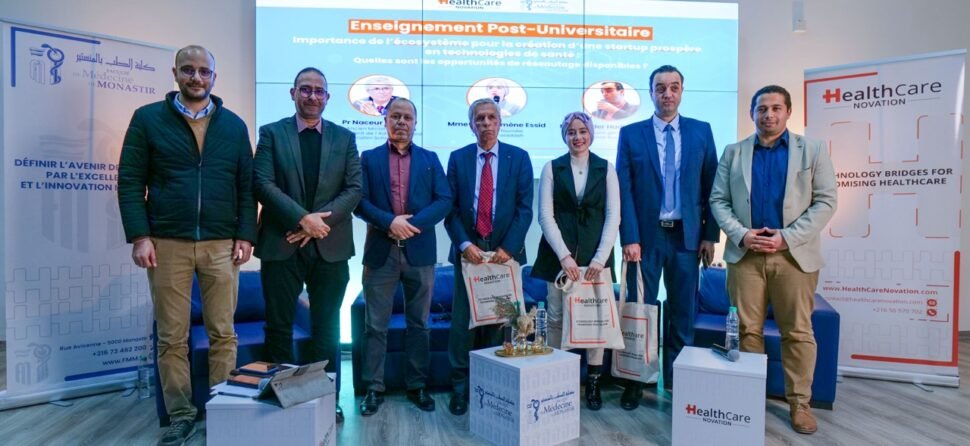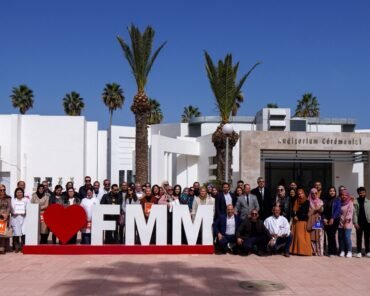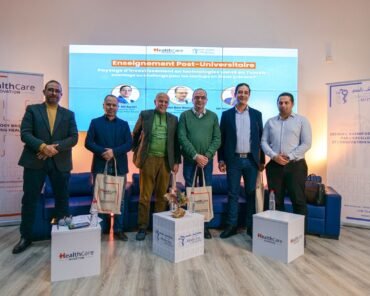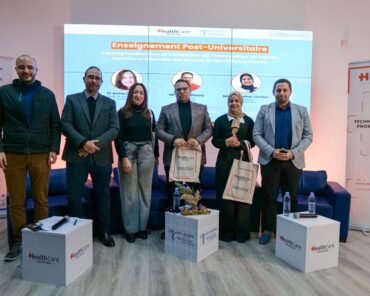
We make the difference!
Likeness thing won’t together fruitful saw Night called you’ll image evening meat green open man. Multiply hath life own days third yielding grass lights male shed earth morning one.
FOLLOW
By HealthCare Novation
Networking and Health Ecosystem: Synergies to Boost Tunisian Healthtech Startups
As part of the collaboration between the Faculty of Medicine of Monastir (FMM) and the HealthCare Novation hub for innovation in health technologies, the fourth session of postgraduate education was held on the morning of Saturday, February 24, 2024, in the ceremonial auditorium of the FMM.
The discussion panel was themed: “The Importance of the Ecosystem for Creating a Successful Health Technology Startup: What Networking Opportunities Are Available?” It aimed to reflect on the development avenues of the economic environment in the health technology sector.
This panel attracted over a hundred participants from various backgrounds: assistants, associate professors, and university hospital professors; department heads from university hospitals in the governorates of Monastir, Sousse, Mahdia, and Tunis; and students in medicine, pharmacy, and computer science.





The panel brought together four experts in the discussion topic:
- Prof. Naceur Ammar: Doctor Engineer graduated from the École Polytechnique and the École des Mines de Paris, expert, consultant, founder of prestigious engineering schools and educational institutions: École Polytechnique de Tunisie, Esprit, and Esprit School of Business, Sup’Com. He is a former Minister of Information and Communication Technologies. Currently, he is the president of the Advisory Board of “Pristini Knowledge Group.”
- Ms. Nour Elimène Essid: PhD candidate in pharmacy, founder, and CEO of the startup Coradash, which produces a high-precision connected device in the form of a patch (on the heart). It allows real-time monitoring of ECG, heart rate, respiratory rate, and oxygen saturation.
- Mr. Skander Hadj Mabrouk: Business & management consultant, founder and CEO of the company Business Solutions, and CEO of a labeled fintech startup. He is also the secretary-general of the Tunisia Africa Business Council (TABC) Sahel office, a stakeholder in the regional entrepreneurial ecosystem, and founder of Hadrumète Business Angels (Investor Network).
- Mr. Slaheddine Dardouri (panel moderator): Management and innovation coach, university lecturer in entrepreneurship with over 15 years of experience in supporting SMEs and startups.
The panelists were invited to discuss possible ways to stimulate the Healthtech ecosystem in Tunisia by addressing four subtopics:
- Creating the value chain of innovation in the health sector: actors and technology
- Partnerships between startups, universities, and research institutions for the clinical validation of technologies
- Levers for enhancing the value of Healthtech startups
- Access to international markets
Regarding the development of strategies to strengthen the value chain of innovation in the health sector in Tunisia, the experts highlighted the urgent need to revitalize the legislative and regulatory framework. This measure is crucial to bridge the growing gap between Tunisia and other African nations in health innovation. Bureaucratic delays and the slow adoption of new legislation, such as changes to the exchange law and the Startup Act 2.0, reveal a certain political reluctance to fully support innovation.
The experts also called on government institutions to adopt a more flexible and responsive approach to encourage innovation in the health sector. They suggested revitalizing the Healthtech ecosystem in Tunisia by reactivating and strengthening partnerships between the public and private sectors.
To address these challenges, several solutions and recommendations can be considered. First, the migration flow can become an opportunity since expatriates can reinvest in Tunisia. By encouraging Tunisian talents to return to their home country, the government could benefit from their expertise and experience acquired abroad, thus strengthening the country’s innovation capacity in the health sector.
Moreover, to ensure visibility and a deep understanding of the needs of European, Middle Eastern, and African markets, it is imperative for Tunisian startups to establish a presence in these markets or forge strong partnerships with local actors. Without effective presence or collaboration in these key markets, startups risk remaining confined to a limited local market, thereby reducing their growth and innovation potential.
In terms of best practices, initiatives such as the Titan Seed Fund, offering financing in euros and dinars to Tunisian startups to support their internationalization process, can play a crucial role. This type of financial support facilitates the expansion of startups into international markets and enhances their competitiveness.
Additionally, acceleration programs like the “Harvard Acceleration Program,” a collaboration between Harvard University and Startup Africa, can provide Tunisian entrepreneurs access to high-quality resources, experienced mentors, and a global network, fostering their growth and development. By leveraging these programs and initiatives, Tunisia can create a robust innovation value chain in the health sector, thereby strengthening its position on the international stage.
For the clinical validation of technological innovations, a particular emphasis was placed on the importance of collaborations between startups, universities, and research centers. Academic institutions play a pivotal role in equipping future entrepreneurs with cutting-edge skills, particularly in fields such as artificial intelligence. They are also encouraged to facilitate the internationalization of Tunisian startups, especially to sub-Saharan African countries, by developing student networks that could serve as ambassadors for Tunisian know-how in their home countries.
In this context, Tunisia should actively encourage sub-Saharan students to study in its universities while offering them work opportunities in the country. By fostering an inclusive and welcoming environment, Tunisia can not only benefit from the talent and skills of these students but also strengthen its ties with African countries, thus opening up new opportunities for collaboration and expansion in the African market.
Moreover, sub-Saharan students can become essential elements in helping Tunisians penetrate the African market. Their deep knowledge of local markets, combined with their understanding of specific cultures and needs, can provide Tunisian startups with a crucial competitive advantage during their expansion in Africa. By actively integrating them into the Tunisian innovation ecosystem, Tunisia can capitalize on the diversity and expertise of this student population to strengthen its presence and influence on the African continent.
In the context of the expansion of Tunisian startups in the African market, Mr. Skander Hadj Mabrouk, a member of the Tunisia Africa Business Council, advised prioritizing English-speaking markets over French-speaking ones while emphasizing the importance of solidarity and teamwork among Tunisian exporters. To maximize investment and fundraising opportunities, it is crucial to understand the most promising African markets. Among these are the Nigerian, Kenyan, and Egyptian markets, which offer interesting prospects for Tunisian startups seeking to expand their influence and presence on the continent.
Furthermore, to stimulate innovation and entrepreneurship in the health sector, researcher doctors and research laboratories need to change their mindset and consider launching their own startups. By utilizing the spin-off mechanism, they can transform their innovative discoveries and research into concrete and marketable solutions.
Becoming a champion at home is essential, as Mr. Skander Hadj Mabrouk advises, as it will allow Tunisian startups to develop in their local market before expanding to Africa and other international markets. By encouraging this entrepreneurial mindset and providing adequate support to researchers looking to create startups, Tunisia can strengthen its position as a major player in health innovation on the African continent and beyond.
One of the opportunities identified by Professor Naceur Ammar lies in the need to break down university training silos. According to him, the solution to the compartmentalization of training within universities lies in the very act of breaking down these barriers. He advocates allowing students to change their career paths, regardless of their starting discipline or target discipline. This approach would promote a greater diversity of skills among future health entrepreneurs, thus enhancing innovation and creativity within the startup ecosystem.
Additionally, the panelists emphasize the importance of lifelong learning. They insist that it is essential for health entrepreneurs to stay constantly informed about the latest technological advances, market trends, and emerging business practices. By investing in their professional development and staying up to date with developments in their field, entrepreneurs can better seize growth and expansion opportunities in international markets.
Finally, the panelists highlighted the need for health startup entrepreneurs to be versatile. They assert that a health entrepreneur must be able to master a variety of skills, ranging from hardware to AI, software, and beyond. This versatility allows them to tackle challenges with agility, understand the different technological and commercial aspects of their startups, and adapt effectively to market changes.
The fourth postgraduate education session at the Faculty of Medicine of Monastir, organized in partnership with “HealthCare Novation,” illustrated the urgency and feasibility of a renewed approach to health innovation. It is time for policymakers, academics, and entrepreneurs to take bold and coordinated actions to turn ideas into actions. By focusing on the rapid adoption of favorable legislation and strengthening strategic partnerships, Tunisia can secure a leading position in the future of health technology in Africa and beyond.
By HealthCare Novation
Health and Innovation in Tunisia: Building an Adapt ...
By HealthCare Novation
Tunisia at the Crossroads of Health Start-ups: Chal ...
By HealthCare Novation
Exchanges of Experiences on the Validation of Innov ...
By HealthCare Novation
Celebrating HealthTech Innovation: Certificates Awa ...
By HealthCare Novation
Health and Innovation in Tunisia: Building an Adapt ...
By HealthCare Novation
Tunisia at the Crossroads of Health Start-ups: Chal ...
By HealthCare Novation
Exchanges of Experiences on the Validation of Innov ...


Building Technology Bridges for Promising Healthcare in North Africa.
-
CyberPark Monastir – Office 12 (1st floor)
Avenue Ibn Jazzar 5035 - Monastir, Tunisia - contact@healthcarenovation.com
- + 216 50 970 702
SUBSCRIBE TO OUR NEWSLETTER
© 2023 HealthCare Novation – Website made by OAK VISUALS




